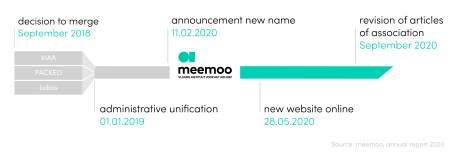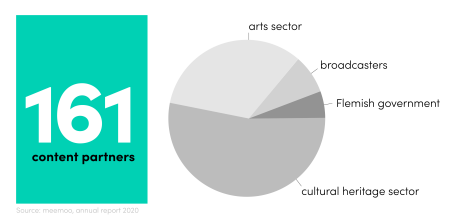2020 in brief
We can safely say that 2020 was a year for the history books – and the archives. All organisations faced challenges and surprises, including meemoo. Even though working from home was already ingrained as part of our infrastructure and processes, there was still a very considerable impact on the team from March 2020 onwards. We also saw an increase in demand for support from the sector and our content partners, and we made extra efforts to assist teachers and students with The Archive for Education.
So the coronavirus pandemic ensured it was an intense year, but we still managed to achieve our main objectives despite all the adaptations we had to make and the delays we encountered (for example with suppliers), using the objectives from our long-term plan as our guiding principles. In this article and those that follow, you can read about meemoo’s most significant achievements together with our partners.
A new identity
2020 was mainly the year of our rebranding. Following our merger in 2019, we worked hard on a shared vision and mission, a long-term plan, a new visual identity, and a new name. We announced all of this at an event for our partners on 11 February 2020. VIAA, PACKED and Lukas joined forces to become meemoo, Flemish Institute for Archives. We celebrated the birth of meemoo and the New Year in STAM - Ghent City Museum together with 163 partners and colleagues.

The communications team designed and built a new website from their home offices, and more details about our unified organisation were made available to the wider public at www.meemoo.be from 28 May onwards. This website – available in both Dutch and English – is the best place to read about what we’re doing and our training courses, events, publications, latest news and projects, among other things.
Once the new website had gone live, we were also able to combine the different organisations’ newsletters into a single meemoo newsletter, which keeps our subscribers up to date with all the news about our work and the sector in around ten general updates a year. (Anyone looking for the subscribe button can find it here.)
In September 2020, we revised our articles of association, and our new name became the official name of the vzw (non-profit organisation). The aim of our association was adapted in accordance with the legislation that describes our mandate, and our articles of association are now also fully in line with the new Code of Companies and Associations.
Happy content partners
We ended 2020 with 161 content partners. This means we have 161 organisations entrusting us with their content, taking part in our digitisation projects, and storing their digital content with meemoo. Over half of these content partners come from the cultural heritage sector, with the arts sector accounting for a further third. Broadcasters (8.1%) and the Flemish government (5.6%) make up the smallest proportion.

In February, we welcomed our content partners to an event to officially announce our new name. And in the autumn, 148 attendees gathered virtually for an online partner event where they learned about our various projects and aspects of our work in eight different sessions spread over five days. There was also an opportunity for them to provide feedback and ask questions.
We keep our content partners up to date with our work via our partner updates – this newsletter only includes what is relevant to their specific sector and roles, to ensure that our collaborations support them rather than take up their time.
Partners can find more information about our collaborations, the various tools we use and the projects they are involved in on our partner portal. This includes their own Dashboard, where they can look up reports that provide insights into their content stored with meemoo. This Dashboard was fully updated in 2020, with a revamped reporting module that makes it easier to expand with fewer intermediate links.
Content achievement
The meemoo team worked hard to achieve almost all its targets, putting lots of effort into our platforms, projects and day-to-day operations. On 31 December 2020, our team had 42 permanent employees supplemented with temporary workers, seconded teachers and interns. All these people worked from home almost full time in 2020, but we still managed to keep our collective team spirit up.
Covid-19 and the restrictions imposed by the pandemic had a huge impact on our way of working, but our incomes remained relatively stable. These incomes consist primarily of grants from the Department of Culture (€5,280,000) and the Department of Education (€231,000), and various project grants. The incomes from image sales were higher than expected (€58,000) following on from the end of the ‘Van Eyck Year’.
There were some significant differences on the costs side, however, for example as a result of digitisation projects being postponed. In total, expenses amounted to €133,262 less, and with €226,369 more income, compared to the previous year. This increase in income was partly due to additional orders, but there was also a one-off major change in the way we handle investments for accounting purposes.
Curious to find out how we performed in our core tasks in 2020?
>> Read more about our digitisation services
>> Discover what we archived and how
